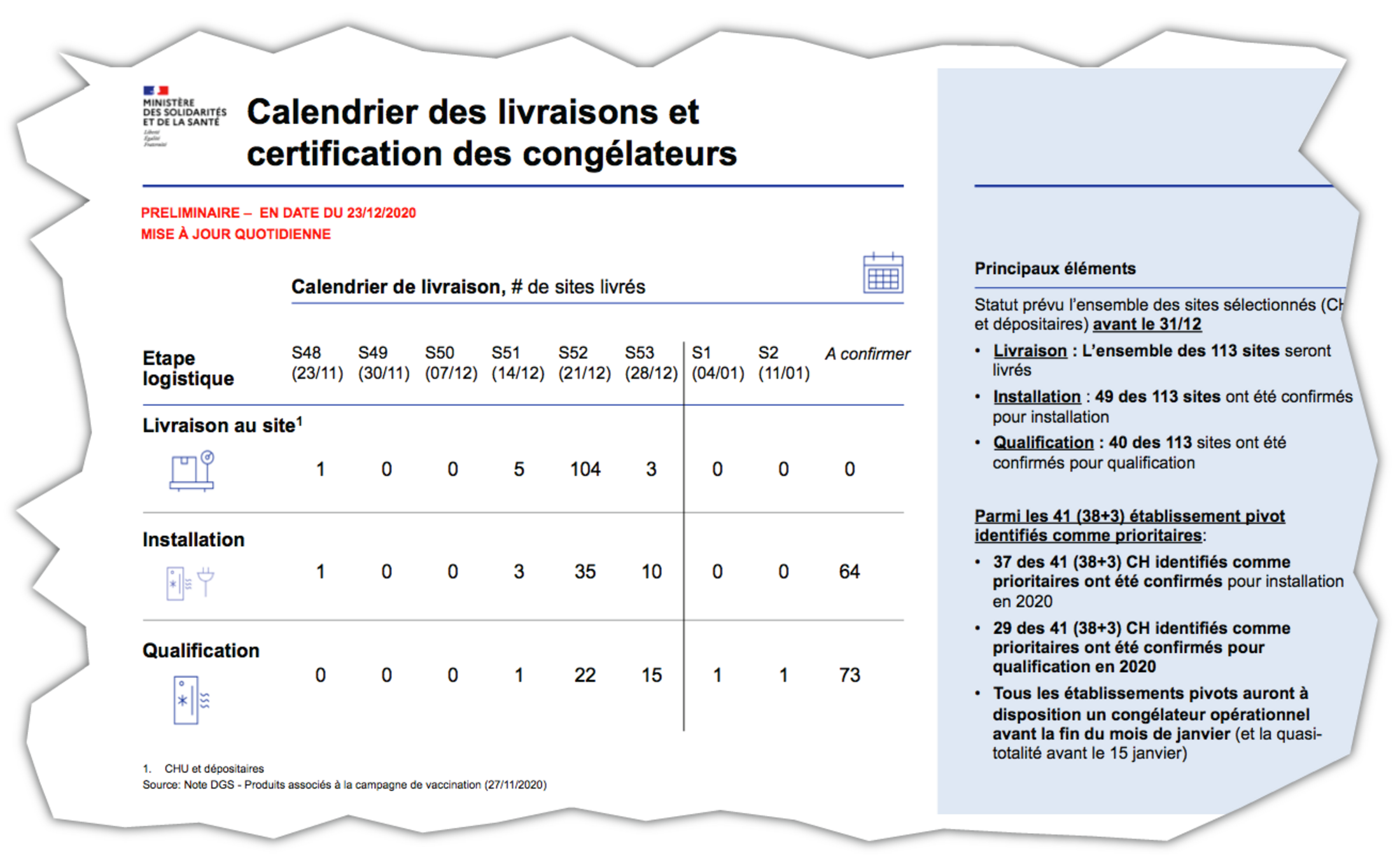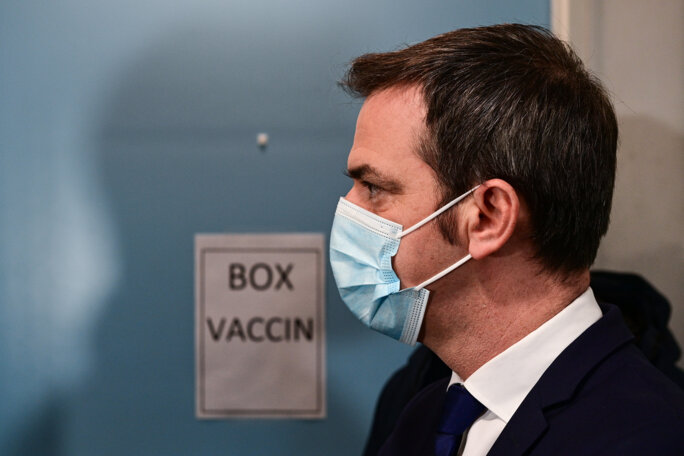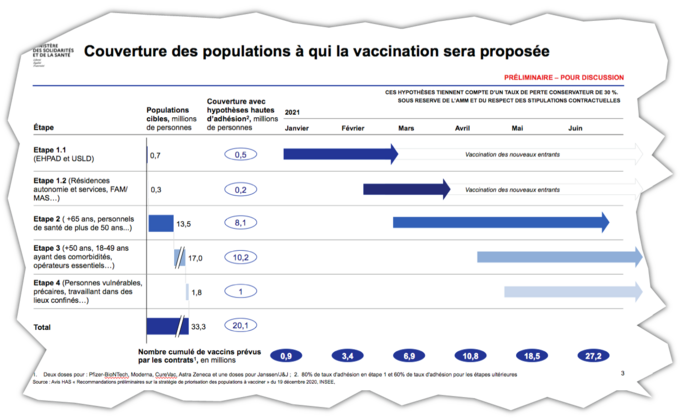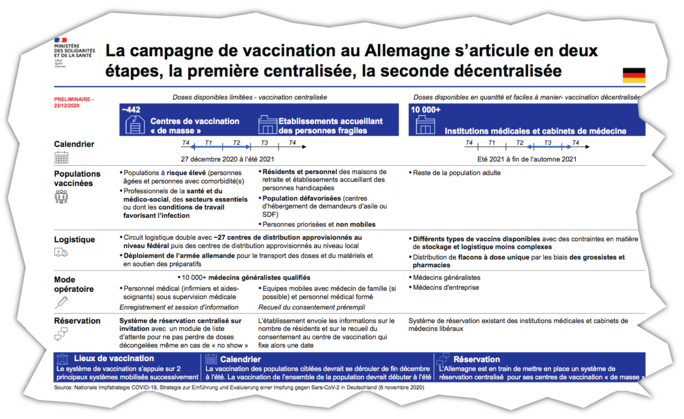It is one of the strategic posts overseeing the distribution of vaccines in France and yet it is currently vacant. According to Mediapart's information, the head of the 'alert and crisis department' (DAC) at the public health agency Santé Publique France (SPF), which has been tasked by health minister Olivier Véran with distributing millions of doses of vaccine against Covid-19, was not immediately replaced when she left her job on December 31st 2020.
A recruitment firm, which was asked by the SPF at the end of November to find a replacement, is still assessing candidates.
This untimely vacancy is just one illustration among others in the story of the vaccination campaign fiasco in France that Mediapart has pieced together. Our investigation shows that the authorities devised an extremely slow rollout plan which was then hampered by a failure to anticipate the logistics involved.
Back on December 3rd 2020 prime minister Jean Castex explained: “Distributing millions of vaccines is a very complex operation. We've been working on it for several months, we've bought the necessary equipment and materials. We will be ready for the first vaccinations as soon as the vaccines are available.”
On December 16th 2020 the government's 'Mr Vaccine', immunologist Alain Fischer, who heads the vaccine strategy committee at Santé Publique France, told the French Senate that “at least a million doses” would be delivered “at the end of December or start of January”.
Yet because of operational constraints, the vaccine doses delivered by Pfizer languished in a mslal number of national centres, unable to be distributed en masse across the country. This delay put France at least three weeks behind countries such as Germany (more than 400,000 vaccines) and the United Kingdom (1.3 million vaccines; the vaccine had been authorised there on December 3rd).
An internal Ministry of Health document (see below), which was presented at a meeting on December 23rd, in fact reveals that while the French state had possession of all the 113 special freezers needed to store the vaccine around the country, it was only able to have 38 of them in place and working by the week beginning December 28th. This was the week that the vaccination campaign itself began. During that same meeting the ministry acknowledged that the “deployment of the vaccine over all the country” could only take place in “mid-January”.

Enlargement : Illustration 1

Ultimately, in the face of public incomprehension and protests from local mayors and councillors, and amid dismay even from its own MPs and councillors, on Monday January 4th the government changed gear and sought to speed up the process. But it has struggled and may not be able to make up the lost time. Even though hundreds of thousands of doses of the vaccine – which is said to have 95% effectiveness – have been delivered, and while the 'English' variant of the coronavirus which is apparently more infectious is not yet widespread in France, only around 45,000 people had been vaccinated here as of Thursday January 7th, according to the authorities. “Each day of delay means needless deaths,” one Member of Parliament for the ruling La République en Marche party told Mediapart.
To justify the slow start to the campaign the government initially pointed to the mistrust of a section of the French population about a vaccine that has been tested and trialled quickly in a bid to tackle the pandemic. On Thursday January 7th the health minister Olivier Véran came up with a new explanation when he told L’Opinion newspaper that the “trial period” for the vaccine rollout had been “useful”. The minister said: “We avoided serious allergic reactions, we learnt from the experience of the Germans, who sometimes gave five doses to a patient. That enabled us to make the protocol secure.”
This line of argument ignored the glaringly apparent logistical failures. “It was said that the logistics were not put in place in a satisfactory way. In December we didn't know how to distribute this vaccine … that was a problem!” said a member of the board of the hospital federation the Fédération Hospitalière de France (FHF). “Yes, it's complicated,” this source added. “But it's a simple issue of logistics. Yet there were mistakes. We've got firefighters and military doctors who know how to do it and they weren't called up! They didn't listen to the criticism. If we were doing it right there should be 300,000 people vaccinated in France today!”
“Hundreds of thousands of doses are currently languishing in freezers!” wrote a professor of logistics, Aurélien Rouquet, in Le Monde. He said that the “most infuriating” aspect is that the “necessary logistical know-how is available and that the people who possess it are ready to be of service to the government!” The professor noted that the France Supply Chain association, which represents those in charge of logistics at most major companies, was “offering to help the government and was suggesting the creation of a 'Supply Chain Vaccine' committee”.

Enlargement : Illustration 2

Instead, Olivier Véran chose to rely on Santé Publique France (SPF) despite doubts over its ability to manage a task of such a scale. At the start of the health crisis the problems the agency had in ordering and distributing face masks forced the then-prime minister Édouard Philippe on March 4th to remove this role from them. Instead he handed this task to an “inter-ministerial logistical coordination cell”, as Mediapart revealed.
And despite the dedication of its officials, the SPF also seemed overwhelmed in organising back-up health workers, another area of which he had charge. The reason, according to one ministerial source back in the spring, was that the agency, which is slow to react and lacking in resources, is “equipped with a five-year plan like from Soviet times”.
General Richard Lizurey, the former director-general of the Gendarmerie, clearly identified the problem in the report he wrote for the government in the summer of 2020, a document that was supposed to prepare the country for tackling a second wave. “Santé Publique France, which is in charge of managing reserve health staff and the strategic stocks needed to protect the public, had difficulties in carrying out this logistical operation, due in particular to a lack of sufficient competency and means,” wrote the general. His report noted that the seven people who usually worked on handling logistics at the agency only received a small degree of backup to deal with the crisis.
“As the logistical issue of protective equipment was a major weak point in the handling of the crisis, it would useful to carry out a RETEX [editor's note, a French abbreviation for getting feedback from users] on the mobilisation of logistical capability in the area of health,” General Lizurey wrote at the time. He added that it was particularly important to “study the manner of reinforcing Santé Publique France in terms of resources and capability, and to study the synergies that could be created with other ministries, in particular the Ministry of Armed Forces who have health logisticians”.
Santé Publique France has had to adapt quickly
According to Mediapart's information, the teams of officials at SPF, who are already exhausted by months of relentless work, have not received substantial help since the Lizurey report was delivered in June. It should be noted that the minister of health Olivier Véran himself acknowledged in November 2020 that he had not been a recipient of that report, even though it had been commissioned by his own government.
At France's National Assembly a fact-finding committee expressed its concern about the “absence of internal resources at Santé Publique France to manage the response to a health crisis and the continuation of an organisation which doesn't foresee a scaling up of its logistics”. Meanwhile a commission of inquiry in the French Senate revealed that the “post of 'director of communication and dialogue with society' at Santé Publique France remained vacant from March to May 2020 and then again from July 2020 to October 2020” and that this could have “affected the capacity of the agency to make its voice heard in the public debate during the epidemic over preventative measures”.
Despite this episode, no one seems to have deemed it necessary to ensure that such a problem did not reoccur over the departure of the female director of the 'alert and crisis department' (DAC) at the agency on December 31st 2020; a move that had been known about for several weeks. This group oversees the public health agency's small 'pharmaceutical implementation' unit, which is in charge of logistics for the vaccine. When questioned about the reasons why this change of personnel had not been anticipated, Santé Publique France declined to comment.
The agency plays a crucial role in vaccine distribution as it is the interface between the seven national sites used to store the vaccine - which comes from the Pfizer factory in Belgium – before being sent off around the country to be kept in super-freezers. Each département or county in France is supposed to have one of these freezers in order to store the vaccines at a temperature of -70 °C for up to six months. For transport and short-term storage – a maximum of five days – it can be kept at 2 °C to 8 °C.
According to the December 23rd document the delivery of the 100 establishments chosen for the super-freezers only started in the week beginning December 21st. At a press conference held by the hospital federation the Fédération Hospitalière de France (FHF) on Tuesday January 5th, its director of nursing, Alexandre Mokede, explained that only “half of the support establishments have had freezers delivered” and that they would only all arrive “between now and mid-January”.
The president of the FHF, Frédéric Valletoux, said that the “campaign was only really due to start on January 15th. There was nothing stopping us from flagging up a bigger campaign straightaway. That was our view, we weren't listened to”. In fact the campaign to “scale up” the vaccination campaign in care homes – the start of mass vaccination – was not scheduled until January 18th. Up to now, the vaccinations that have taken place in care homes have essentially been a trial.
On top of the logistical issue of maintaining the cold chain for the vaccines, there is also the question of security. The government fears that vaccine convoys could be a target for attack. Santé Publique France (SPF), who are organising the deliveries on the ground, is working closely on this with the government task force dedicated to vaccination. In another signs of the problems the government has faced, the person in charge of logistics within this task force has just been replaced.
Despite the government's stated intent to accelerate the vaccination campaign, Mediapart understands that several hospital still experienced delays at the start of the week beginning January 4th. SPF was apparently unable to give them details about future deliveries. The agency did not respond to Mediapart's questions on this.
Some pharmacists in hospital pharmacies that have received both vaccines and syringes from SPF have expressed their astonishment at having received equipment that they consider to be “unsuitable”. They have been sent 5 millilitre syringes with which to make up the vaccine doses through injecting sodium chloride. In fact, they have to inject 1.8 millilitres of sodium chloride into each vial of 5 doses, so 2 millilitre syringes would have been more suitable. The hospitals are also surprised to have received 18mm needles for the intramuscular injection, when the vaccination guide clearly indicates that the needles should be 25mm.
The reality is that Santé Publique France has had to adapt in a hurry to the government's change of direction. “The 18mm needles are suitable for elderly people who have less muscle mass,” explained Bernadette Coret-Houbart, head of the pharmacy department at the Robert Ballanger hospital in Aulnay-sous-Bois, a suburb north east of Paris, who as part of her job takes delivery of vaccine doses and divides them up between a large part of the département of Seine-Saint-Denis. “We subsequently received 25mm needles, suitable for health professionals. This is an unprecedented, very fast campaign, there are going to be some adjustments and that's perfectly normal.”
The pharmacist does not hide her irritation at the row over the slowness of the vaccination campaign, a controversy she considers to be “pointless”. She said: “We have had Covid with us since February, we've had lots of deaths, we're exhausted. We all want to get out of this crisis. Now we have to vaccinate.”
On the evening of December 31st health minister Olivier Véran said that, contrary to what had been expected, vaccines would be opened to health professionals over 50. That campaign started on Saturday January 2nd at the Hôtel-Dieu hospital in Paris with the televised vaccination of Patrick Bouet, president of the medical body the Conseil National de l’Ordre des Médecins. “We initially opened one vaccination cubicle now there are five, and we are vaccinating several hundred health professionals a day. We are getting lots and lots of requests,” said immunologist Jean-Paul Viard, who was involved in the opening of this vaccination centre, the first in France.
The demand is so strong that the government has also brought forward vaccinations for those over the age of 75 to the end of January, as well as for firefighters and domestic care assistants. These various announcements have completely changed the original vaccination plan, proof of the panic that has gripped the government.
Mediapart has got hold of the document that was presented to hospital directors by the health service 's senior management, assisted by the consultants McKinsey, on December 23rd. Details of this meeting were first revealed on January 6th by the investigative weekly Le Canard Enchaîné. The document shows that only elderly people in care homes were due to be vaccinated under phase 1 of the vaccination programme. Step 2 of the plan was only due to begin at the start of February.

Enlargement : Illustration 3

Everything has been turned upside down and rapidly changed. It is now deemed unacceptable that the existing French strategy means the country is now three weeks behind its European neighbours, who started vaccinating at the same time. While 45,000 people have been vaccinated in France, 413,000 have received a vaccine in Italy, 207,000 in Spain, and 66,000 in Estonia, according to the website Our World in data. The figure for Germany is 417,000.
The French authorities knew the German plan from the start of December
Yet none of this should have come as a surprise, for the French authorities knew perfectly well that Germany at the very least was going to start its vaccination campaign much more quickly. To find out what was happening elsewhere they had commissioned consultants McKinsey, who helped develop both the vaccination strategy and a 'benchmark' approach to compare other campaigns.
By December 23rd 2020 it was already clear that the Germans would perform much better. The first German vaccination phase started on December 27th and is aimed at a broad base of the public: all people at a higher risk, whether they are elderly or have other illnesses, all health professionals, the residents of retirement homes and poorer sections of society. To achieve this Germany has created mobile teams to go into retirement homes, and mass vaccination centres have been set up. Even the German army has been called up to help support these measures.

Enlargement : Illustration 4

As Olivier Véran explained at the start of December, France has instead opted to rely on the “usual stakeholders” to carry out vaccinations and has excluded the use of “vaccinodromes”, a derogatory reference to the vaccination centres used in the 'swine flu' A/H1N1 pandemic of 2009 and 2010.
Those on the ground are openly angry about the mounting controversy over the vaccination programme, pointing out that they have simply been following the plan that was given to them by the Ministry of Health. “We started to meet at the start of November,” said a head pharmacist in a key establishment in the Seine-et-Marne département south-east of Paris. “We are rolling out the process, there's no delay. We are even being asked to speed up to vaccinate health professionals. There is strong demand, it's a major task, but I'm optimistic. We've had two waves here, we've been traumatised by this virus, we want to get out of it,” she said.
The pharmacist also points to what she sees as the misguided and changing view of the public on the issue. “First of all there was a fear there would be no vaccine, then a fear that we'd have one too soon without enough time to test it. And now there's a fear that we are too late,” she said.
Pascal Champvert, president of the association for bosses of care homes and services for the elderly, the Association des Directeurs au service des Personnes Âgées (AD-PA), has no qualms about criticising the state's “major error over masks and then [care home worker] bonuses”. But over vaccines he is more forgiving. “The government made the mistake of not opening vaccination more quickly to those over 75 who live at home and who are also all exposed to the virus from their families or their home carers. The mistake's been rectified and I'm delighted about that,” he said.
Those close to President Emmanuel Macron have spoken of his anger about a civil service “incapable of organising a massive vaccination campaign” or only able to “churn out an incomprehensible 45-page vaccination guide”. The guide in question sets out the process for vaccinating in care homes: its preparation, the pre-vaccine consultation and the way it is administered. Health minister Olivier Véran has announced that he is going to “simplify this vaccine consultation” without giving more details.
However, Pascal Champvert warns: “If the idea is to reduce the measure then that's a bad idea. It's not too demanding, it came as the result of a consultation. Elderly people have the right to express their consent, doctors are not going to decide in their place. That takes time as some have cognitive issues and that creates legal problems that no one is ever interested in.”
Henri Bergeron, a sociologist and director of research at the French research centre the Centre National de la Recherche Scientifique (CNRS), said that “sometimes it's a bit too easy to blame our bureaucracies, and very typical of the attributing of responsibility that happens during crises”. He said: “There was the expression 'the logistics will follow' [editor's note, a comment attributed, probably erroneously, to General Charles de Gaulle] and now we also have 'the logistics will pick it up'. You might conclude that in certain cases the health service is powerless, but you have to produce proof in precise examples. And let's not forget that in general the French health system performs pretty respectably and remains relatively inexpensive.”
Some critics wonder whether the French government, aided by consultants McKinsey, has committed the mistake of adopting a defeatist approach. The document of December 23rd refers to the idea that 80% of people in care homes will take the vaccination and 60% among the rest of the general public as being at the “upper” end of expectations. The care home and elderly services federation the Fédération Nationale des Associations de Directeurs d’Établissements et Services pour Personnes Âgées (FNADEPA) has just carried out a snap poll. “The initial feedback … is that between 50% and 90% of elderly people in care homes accept having a vaccination, and on average 70%,” said its director Annabelle Veques, welcoming the findings.
“It's said that we must restore the confidence of citizens in the public and health authorities, but there's also something that needs to be done over the confidence of the authorities themselves,” said sociologist Henri Bergeron. “The fear of media coverage of some side effects, of something that suddenly takes off and gets out of control, is what has, to an extent, led to the way the vaccine strategy has been organised.”
-------------------------
If you have information of public interest you would like to pass on to Mediapart for investigation you can contact us at this email address: enquete@mediapart.fr. If you wish to send us documents for our scrutiny via our highly secure platform please go to https://www.frenchleaks.fr/ which is presented in both English and French.
-------------------------
- The original French version of this article can be found here.
English version by Michael Streeter


